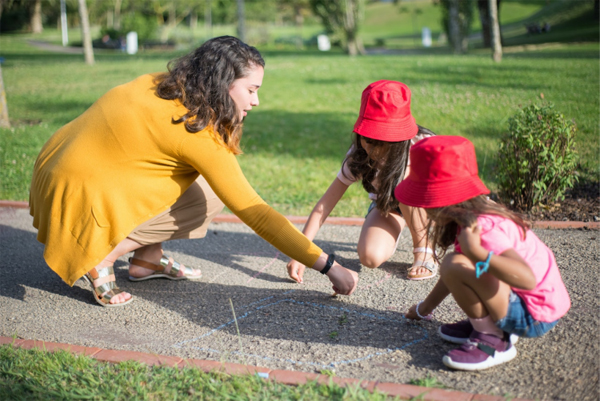Unlike most expats in China, my adventure here didn’t start with an English teaching job. Instead, I took a job as an au pair/nanny for six months. If you’re thinking about doing the same, here’s my take on what it’s like to be an au pair in China.

The role
Why do Chinese people fork out quite a bit of cash to have a foreign au pair in their house when they could have a cheap Chinese ayi or a Filipino nanny who will help them with the housework as well as look after their kids? The answer is that many parents want to, not only to improve their childrens’ English, but also to let Western culture and habits rub off on them. What better way to have your kids effortlessly absorb another culture than by having an older foreign “brother" or “sister" living with them at home?
As a rule, au pairs are not hired to teach English to their charges but to interact and form relationships with them. As a result, the kids learn how to get along with people from different cultures in the most natural way possible.
Foreign au pairs in China can typically choose to stay with a family for 3, 6 or 12 months. Candidates do not need to be able to speak Chinese and are not usually required to do much housework. As most host families are relatively wealthy, they will probably have their own ayis for that.
Au pairs in China usually work between 20 and 30 hours a week, depending on the tasks agreed upon in the au pair's contract. Such tasks may include picking up or taking the kids to school, helping with homework, hanging out after school and taking the children out for activities.
The benefits
There are many benefits to working as an au pair in China. Au pair agencies usually provide free Chinese classes and organize social activities, which gives you an instant sense of purpose and community in China. Living with a host family also provides au pairs with a lifetime opportunity for total cultural immersion, which is undoubtedly the best way to learn a new language. As happened with me, some families might even take their au pairs on holiday with them to really exotic destinations.
Au pairs in China also generally receive round-trip flights from their home country, a modest monthly stipend, free meals, free accommodation in the form of a private bedroom in the family home, a bonus for contract completion and medical insurance. Benefits vary among different agencies, so it’s important to compare the packages carefully and pick the one most suitable for you.
And don’t forget about the best thing – you’ll make friends with people from all over the world: au-pair programs attract tons of young people from almost every single European country, as well as North and South America.
How to do it
So, how does one become an au pair in China? Here’s a quick rundown of the process:
1) Find an agency
Au pair candidates must first find an agency and ensure they fulfill the requirements. (Yes, you do need an agency because they are the ones who will get you your Chinese visa, without which you cannot legally work here.) If you search online, you’ll find at least a dozen different agencies to choose from. Take your time to go over their offers and select the one that appeals to you the most. You can usually complete a short online form or register your interest via email at this stage.
2) Interview with an agency
Next, you’ll probably have to undergo an online interview in order to convince the agency that you have what it takes to be an exemplary au pair. Generally, candidates must be aged between 18 and 29, be fluent in English without a strong accent, have graduated high school and have some form of childcare or babysitting experience. You’ll also need to convince them you’re in good health and physically fit, that you have strong communication skills, are open-minded and easy going, and have a strong interest in China. Obviously, you’ll want to be as upbeat, positive and engaging as possible during your interview.
3) Prepare your documents
If you pass the interview stage, the agency will ask you to supply a number of documents. I had to supply a record of all the illnesses and vaccines I’d had and provide a certificate from my home country to confirm I had no criminal record. I also had to write a little essay about myself and my family background and choose some photographs for a catalog of au par profiles that would be shown to prospective host families.
4) Wait to get picked
Once all the documents are submitted and approved, candidates have to wait until a family expresses an interest in their profile. I was chosen by a family in Chengdu who, amazingly, wanted me to travel with them and their two kids to the Maldives just after my arrival! We exchanged a few emails and the agency arranged a video call. On this call, we talked about our expectations while the host mom’s English teacher listened in to assess my accent.
5) Sign a contract and apply for visas
If both sides are happy, the host family and au pair sign a contract with each other and the agency. The agency will then help the au pair apply for a Chinese visa and book their tickets to China.
6) After arrival
On arrival in China, you’ll be met by the agency before being delivered to your host family. The good news is that if your placement doesn't work out for whatever reason, the agency should have your back and help facilitate a move to a new family. I didn’t stay in Chengdu for the six months I was contracted to simply because I didn’t really click with the family. After just two-and-a-half months my agency reassigned me to a family in Shanghai that I now lovingly refer to as “my Chinese family.” They treated me like their own daughter and, eight years on, we’re still in touch today.
So that’s how I first came to China as an au pair. Perhaps it could also be the right route for you.
| Hot New Jobs recommended for you |
|---|

BWF Environmental and Industrial Technology (Wuxi)
|

Admiral Farragut Academy
|

Beijing-Dublin International College
|

FOTRIC Inc.
|

Longitude International Education
|

China Daily -Wuxi
|

Country Garden Schools
|

Springfield Kindergarten
|

Beijing glodomtec Language Service Co., Ltd.
|

Etonkids International Kindergarten
|
| View More Jobs |
Warning:The use of any news and articles published on eChinacities.com without written permission from eChinacities.com constitutes copyright infringement, and legal action can be taken.
Keywords: au pair in China
All comments are subject to moderation by eChinacities.com staff. Because we wish to encourage healthy and productive dialogue we ask that all comments remain polite, free of profanity or name calling, and relevant to the original post and subsequent discussion. Comments will not be deleted because of the viewpoints they express, only if the mode of expression itself is inappropriate.
Please login to add a comment. Click here to login immediately.